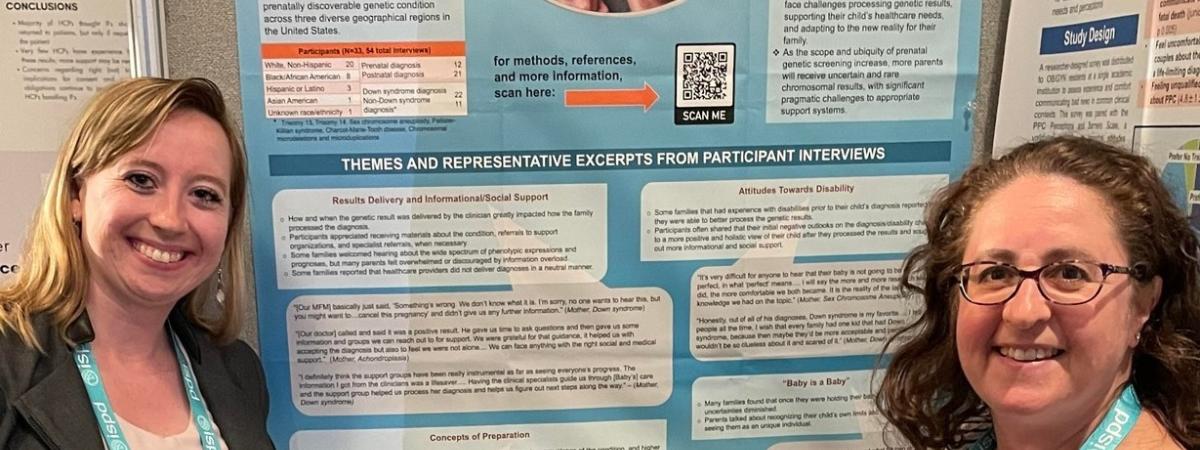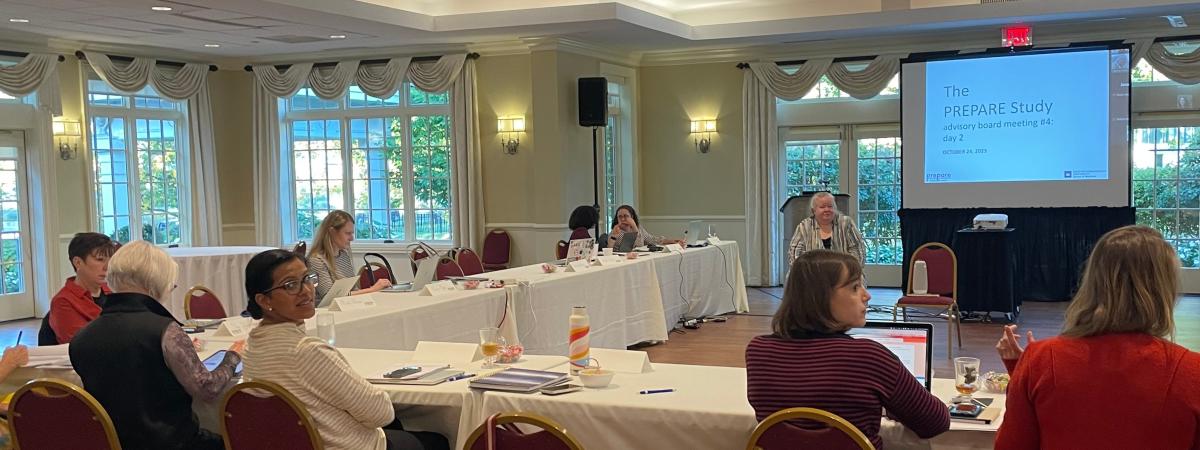Welcome to the Featured Research Projects page for the Department of Bioethics. Here we highlight a selection of our faculty's cutting-edge research at the forefront of bioethics scholarship.
These projects exemplify our department's commitment to advancing understanding and developing practical solutions to critical issues in bioethics. From examining the ethical challenges posed by genetic research, to exploring how to promote equity and justice in medical research and practice, these featured projects illustrate the breadth and depth of our scholarly work.
ELSI
Our department has a long and distinguished track record of conducting cutting-edge research into the ethical, legal, and social implications (ELSI) of genetics and genomics. For over two decades, our faculty have been at the forefront of examining the complex societal issues that arise from genetic technologies.
The project will be conducted by Dr. Lynette Hammond Gerido with co-Investigators Angela White of First Year Cleveland, Dr. Aaron Goldenberg and Dr. Marsha Michie and in partnership with home-based health professionals involved in prenatal and newborn care. They will develop a community-led action research agenda to raise awareness of NBS, identify systems-level actions to improve NBS data to analyze trends in racial disparities, and increase diversity in rare disease clinical trials.
This project is one of 10 selected for funding by the 2024 Clinical and Translational Science Collaborative of Northern Ohio READI Themed Pilot Awards.
This project, led by Dr. Lynette Gerido, has been funded for one year by the Case Case Comprehensive Cancer Center (CCC). The study aims to examine policies and procedures for data use and research recruitment among state cancer registries by conducting a systematic review of state cancer registry policies and procedures; and 2) describe perspectives on the collection, storage, and management of data in a state cancer registry by conducting semi-structured interviews of 40 registrants (10 survivors representing each of the four cancers – breast, colorectal, lung, and prostate cancers).
Marsha Michie and Ruth Farrell are the Principal Investigators for this project funded by NIH in 2021. FAIRER aims to build a framework to ethically and socially guide research in reproductive genomic interventions, with particular concern for the interests of pregnant people with their potential children. Staff include Roselle Ponsaran, Sabina Rubeck, and Harlie Custer.
Marsha Michie is the Principal Investigator for this project, funded by NIH in 2020, which examines how prenatal preparation is understood after a genetic result and build a conceptual model of preparation to guide future research, practice and policy development. Staff include Sabina Rubeck and Jewels Watts.
Marsha Michie is a co-investigator on a study led by Megan Allyse two important stakeholder voices have been largely left out of conversations around the future of p, that will address two key stakeholders of prenatal gene editing in the US context, the patients and families that might be benefitted or harmed by the translation of prenatal gene editing and the scientists and clinicians who would be on the front lines of clinical translation were it to move forward. The study will assess potential governance approaches internationally and explores how they may be implemented in an United States context. Staff include Sabina Rubeck and McKenna Horstmann.
Aaron Goldenberg is a co-investigator on this study led by Kyle Brothers at the University of Louisville, which was funded by NIH in 2021. Staff includes Roselle Ponsaran.
Aaron Goldenberg, along with Beth Tarini of National Children's Hospital, leads this project. Staff include Roselle Ponsaran and McKenna Horstmann.
Maxwell Mehlman and Aaron Goldenberg, along with colleagues at the University of Utah will identify use of different types of recruitment nudges in clinical trials with varying ratios of risk (minimal risk vs. more than minimal risk) and benefit (direct benefit vs. no direct benefit) to human subjects. They will then examine the effects of a set of nudges on recruitment into a minimal risk interview study for healthy adult volunteers and views of participants on the use of nudges for themselves and others. Staff includes Ben Schwan, Roselle Ponsaran and Jewels Watts.
Health Humanities
Our department's health humanities scholars conduct innovative interdisciplinary research at the intersection of health, medicine, and the humanities. Drawing on fields like literature, history, philosophy, and the arts, we explore the human dimensions of health and healthcare to illuminate the social, cultural, and experiential aspects of illness and caregiving.
Funded by a grant from the National Endowment for the Humanities Collaborative Research Program, this project explores how diverse groups in aging societies make meaning out of their perceptions, observations, experiences, and values concerning dementia, creating cultural narratives that inform social attitudes and public policy. Led by project co-directors Nancy Berlinger from The Hastings Center and Erin Gentry Lamb, with an editorial team of Liz Bowen from SUNY Upstate Medical University, Kate de Medeiros from Concordia University, and Janelle Taylor from University of Toronto, this project will produce an open-access supplement to the Hastings Center Report consisting of 18 new essays that consider cultural narratives concerning dementia that circulate in the United States and other aging societies, including within cultures of health care education and practice. Essays reflect new scholarship and empirical research from health humanities, social gerontology, disability justice, medical anthropology, and critical dementia studies. The essays will also attend to how to apply insights concerning how we perceive and think about dementia to efforts to improve experiences of living with dementia and caring for people with dementia.
Sana Loue is conducting research related to the eugenics movement during late imperial period in Russia and early Soviet period and its implications for current genetic technologies.
Erin Lamb was the Principal Investigator, and Ryan Jenkins, a UH Resident in Pediatrics, was a co-investigator, for this 2021 study funded by the AAMC.
Dr. Lindsey Grubbs is conducting a research project on exploring bias in medical charts, with a particular focus on patients with invisible, difficult to diagnose conditions. The study includes comprehensive literature reviews on the presence and impact of bias (of any sort) in medical charts, the history of medical documentation, research on how medical documentation has changed in the era of open notes, testimonial and epistemic injustice in the context of healthcare, and the relationship between stigma and invisible illnesses or medically unexplained symptoms.
Clinical Ethics
Our department's clinical ethics research explores the complex moral dilemmas that arise in healthcare settings. Through philosophically-grounded analysis and empirical study, we examine issues such as end-of-life decision-making, allocation of scarce medical resources, informed consent, and the patient-provider relationship. Our research provides guidance to clinicians, policymakers, and institutions in navigating challenging ethical quandaries.
In this set of projects, Ben Schwan and Daniel Fogal from the NYU Center for Bioethics criticize the standard conception of decision-making capacity and propose a reconception of decision-making capacity that better captures the relevant ethical considerations.
Sana Loue is studying diversity and cultural humility in the helping professions.
Julia Knopes is the Principal Investigator for this grant funded in 2021 by the Greenwall Foundation. Other investigators include Aaron Goldenberg and Cynthia Kabu from the Cleveland Clinic. This project explores how “peers” (people with mental illness who provide services to fellow individuals in recovery) make sense of their complex role as both a care provider and a person with their own health needs.
Monica Gerrek, Marcie Lambrix, and Anna Goff have developed an ongoing systematic review of the literature on ethical issues in burn care.
Monica Gerrek, Marcie Lambrix, and Anna Goff, along with Charles Yowler at MetroHealth and Anjay Khandelwal at Akron Children's Hospital, lead a collaborative qualitative research project that aims to understand patient's decision making capacity after a severe burn injury via in-depth interviews with burn survivors.
Their work was presented at the 2022 American Burn Association conference.
Dr. O. Mary Dwyer is beginning a research project on repeat patients, their care plans, and understanding what social factors may contribute to their situations. The study includes a chart review.
Community
Our department conducts impactful research aimed at informing health policy and fostering community engagement. By partnering with policymakers, advocacy groups, and local organizations, we work to translate academic findings into real-world change. Our projects examine pressing issues such as health disparities, access to care, public trust in science, and the ethical dimensions of emerging technologies, with the goal of promoting evidence-based policies and empowering communities to shape the future of health and healthcare.
Eileen Anderson leads this study to describe and characterize the experiences of stakeholders in the guardian ad litem system, and to assess challenges and gaps in the current system.
Aaron Goldenberg and Marsha Michie are co-investigators on this project, led by Erika Trapl.
The goal is to increase the number of Black men who are screened for prostate cancer, which is the best way to catch prostate cancer early. Screening tests look for elevated or continuously rising levels of PSA — proteins produced by the prostate gland — that can signal the cancer’s possible presence. Staff include Roselle Ponsaran and Xavier Williams.
Laura Morello, Aaron Goldenberg, Kaitlynn Craig, Marsha Michie, and Roselle Ponsaran have worked with Neighborhood Family Practice, a local federally qualified non-profit community health center, over the years on a variety of research studies which have included areas such as genetic research and social determinants of health.
The purpose of this research study, led by Dr. Aaron Goldenberg and Dr. Erin Rothwell, is to implement a new approach for consent education about the retention and use of newborn screening bloodspots within hospitals serving diverse communities. Staff on this project include Roselle Ponsaran.




